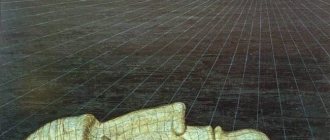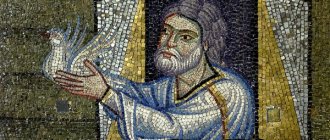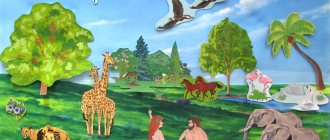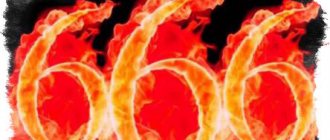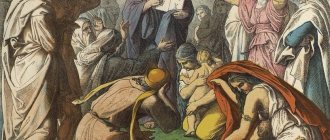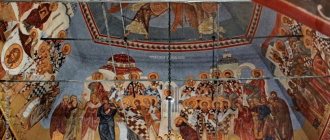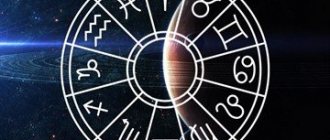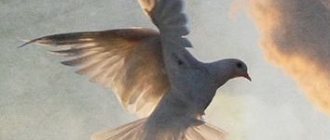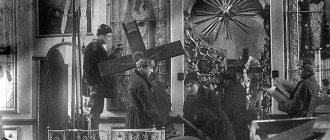Old Testament stories for children. Cain and Abel
CHAPTER FOUR: THE FIRST DEATH
EXILEMENT FROM PARADISE
Due to the slander of Satan himself, people disobeyed God. They violated the commandment and committed a sin.
The moment they did it, they realized that they had changed. That evil has now appeared in them. Do you think this knowledge was good?
No, absolutely not.
Remember, my good friend, in order to gain knowledge, a person must not harm himself or other people. Evil will never teach good. And don’t believe it if they say: you have to try everything in life: both good and bad. It's a lie. Satan's lies. There are things that cannot be done, because they cause damage to a person, his soul, they can even kill the soul. You cannot lie, deceive, steal, hurt others - all this harms, first of all, the one who does it.
So, we know that the cup cannot be dropped, it will break. We know this, but sometimes we really want to see how it shatters into small fragments. And we drop it. The cup is breaking. And no matter how we glue it together, it will never be the same again. Never.
If we break the image of God in ourselves by committing sin, we will no longer be able to return that image in its entirety. Only if God Himself helps us with this. But it will be very difficult for us!
So after sin, people changed. They realized that the seed of evil now lives inside them.
And God knew about it too. And therefore He expelled the first people from the Garden of Eden.
If you have ever been kicked out of class or from a room, you know how hurtful and bitter it is. But you also remember that when you are kicked out, you are more likely to realize that you did something wrong.
God expelled people from paradise so that they would understand the depth of their sin and begin to regret having committed it. So that they repent of their wrongdoing. And also because they could no longer be in heaven. After all, God planted heaven for man as a special place. A place for contemplation and communication between God and man. After sin, man began to hide from God. And the garden where love was supposed to grow suddenly became a garden of deception and betrayal.
And God decided that there is no place for a person who has evil in heaven. Moreover, the Tree of Life grew there. The fruits of which bestowed immortality. If an evil person ate that fruit, he could become immortal, and evil would then have no end.
And God expelled man from paradise and placed in the east near the Garden of Eden a Cherubim and a flaming sword that turned to guard the way to the tree of life.
LIFE OF ADAM AND EVE ON EARTH
The first years after the expulsion were bitter years. People still remembered the happiness of life in paradise. And they knew that they themselves had lost this happiness and would never be able to get it back. In addition to the bitterness of loss, worries and labors fell on their shoulders.
Now people had to take care of themselves, their food, warmth and safety. Adam began to cultivate the soil from which God had once created him. But this land also changed after the sin of people. It was full of weeds and stones. And Adam had to work until he sweated so that the earth would become suitable for seed to grow and feed man.
Nature has also become different. In paradise, man did not know cold, cold, or rain. On the ground, he had to sew clothes for himself and build houses or tents to keep warm and hide from wind, rain or snow.
The relationship between man and animals has also changed. Animals no longer obeyed humans. They stopped seeing him as their master. Moreover, now the man inspired fear in them. For this reason, most animals began to hide from humans in forests, mountains, and steppes. Only a few animals remained with humans. We now call these animals domestic: among them are cows, sheep, horses, cats and dogs.
FIRST CHILDREN
In paradise, Adam treated his wife as a helper, an equal to him. After the sin, God commanded the wife to obey her husband. He placed the husband at the head of the family.
Adam, as head, gave the name to his wife. Adam named her Eve. The name Eve means “Life”, because Eve became the mother of all living.
Eve had a son. And she said: I have acquired a man from the Lord.
So, all children are God's gift to their parents. The Lord gave us to our parents so that they would raise us and bring us to Him. Therefore, we need to obey our parents, trust them, love and care for them.
Eve named her first son Cain. And the second by Abel.
CAIN AND ABEL
The children grew up. Abel became a shepherd of sheep, and Cain a farmer.
On earth, people could no longer communicate with God as easily as Adam did in paradise. Although God continued to care for people and help them, people lost the ability to constantly feel His presence and constantly listen to His voice.
At that time, people had a custom of making sacrifices to God. For the sacrifice, they collected all the best from the new harvest or new offspring and set it on fire. If the smoke from the fire rose high up, it was believed that God accepted this sacrifice, and if the smoke spread along the ground, people believed that God did not like this sacrifice.
And then one day, Abel brought his sacrifice, and Cain his. And the Lord looked upon Abel and his gift. The smoke from Abel's altar rose high into the sky. But God did not look upon Cain and his gift - his altar did not even catch fire.
Cain became very upset and his face fell.
What does “his face fell” mean? He lowered his face in annoyance, hiding his anger and envy.
And this happens to you and me. For example, when we beg something from our mother. We stand at the kiosk, stamp our feet and shout: “I got an A in math today, and I want ice cream!”, and my mother doesn’t seem to hear us and doesn’t buy us anything. That is, she buys our little sister a bun, but not ice cream for us. And we turn away from mom, lower our face and don’t look at her. We're angry. And we don’t talk to mom. Especially with my sister.
This is a very bad condition. Very bad. And we should try not to do this: not beg for anything from our parents - they know better than us what we need, and never be offended or envious.
God saw that Cain had turned away from his brother and even from God Himself. And God asked Cain: “Why are you upset? and why did your face droop? If you do something good, don't you raise your face. And you lowered your face, and there is a bad feeling in your soul. Control yourself, otherwise you may commit a sin!”
Very often, when some bad thought or feeling just arises in us, our guardian angel, our conscience tells us: “Stop!” And we should listen, because in the beginning it is very easy to cope with bad feelings. You just need to turn to God for help, raise your face to Him! If we don't do this right away, it will be much more difficult to deal with the evil in ourselves.
This is how Cain could have obeyed God, but he did not listen to Him. And the evil feeling of anger and envy became stronger and stronger in him. Finally, it became so strong that Cain’s face completely darkened and his mind became darkened. And when the brothers were together in the field, Cain rebelled against Abel and killed him.
Brother killed his brother. This is how the first person on earth lost his life.
CAIN'S PUNISHMENT
And the Lord said to Cain: Where is Abel your brother?
God, of course, knew what Cain had done, but He wanted Cain to understand his guilt and repent himself.
But Cain answered: I do not know; Am I my brother's keeper?
And God saw that there was no regret in Cain, but only anger and hatred.
And God said: What have you done? The voice of your brother's blood cries to Me from the earth!
Do you hear, God said: “the earth is screaming and crying because the blood of man has been spilled on it!” After all, God created man from the earth, and now the first blood has been shed back into the earth. And the earth shook and cried.
Do you remember, Cain was a farmer - he lived by cultivating the land and collecting fruits from it: vegetables and fruits. Now the earth refused to feed Cain.
God said: From now on you will be an exile and a wanderer on earth.
And so it happened.
Cain began to wander the earth, finding peace nowhere. The earth, nature, animals, people - everything inspired him with fear. Having become a murderer himself, he was afraid that someone would kill him too. And God made sure that no one dared to kill Cain. However, fear did not leave the killer. Because his conscience was unclean.
Cain and his children were the first to build fences to isolate themselves from the natural world. The fences became higher and higher, and the houses became stronger and more inaccessible. This is how cities appeared.
To be continued….
Lesson on the topic: Cain and Abel (for children - 8-10 years old)
LESSON ON THE TOPIC:
Cain and Abel
(for children - 8-10 years old).
The purpose of the lesson:
Show the need to fight sin. Reveal the qualities of God: love, patience, justice.
Tasks:
1) Introduce the life of Cain and Abel, the peculiarities of their occupations and character; with the events of the sacrifice, the first murder and God's punishment.
2) Help to understand the causes of sin, find them in yourself, in your relationships with God and your neighbors; realize the need to fight sin.
3) Cultivate reciprocal love for God through obedience to the will of God and fulfillment of His Law.
Equipment:
Bible, illustration “Sacrifice”, board, felt-tip pen, notebooks, pens.
During the classes:
General prayer:
"King of Heaven."
1.Repetition.
Before we begin to get acquainted with the new material, let us remember the life of the first people in paradise.
W: What were the names of the first people?
D: Adam and Eve.
W: What happened in heaven?
D: Adam and Eve listened to the devil and violated God’s commandment and sinned. The fall of people occurred.
W: What entered the world along with sin?
D: Death.
T: Did Adam and Eve repent after committing sin?
D: No. They blamed each other, and even God.
W: How did God deal with them?
D: God punished them and expelled them from paradise. Their life became completely different, joyless.
U: That’s right, sin entered the human soul, the soul began to suffer from sin. From being strong and happy, they became weak and pathetic. Do you think this first sin affected you and me?
D: Yes, the first sin affected us, we are also prone to sin.
W: That’s right, it affected all people, including us. Everyone born after Adam and Eve is infected with sin. What happened to the image of God in man?
D: It is obscured, distorted by sin, but it is there.
U: That’s right, the image of God remains in man, so we can go to God. What should you do for this?
D: Pray, repent of sins, try not to sin, do good deeds, take communion.
W: What did God promise to the first people?
D: That the Savior will come and save people from sin and death.
W: Why does God expel Adam and Eve from paradise? What does He want to achieve with this?
D: He wants them to repent.
W: That’s right, He wants them, having seen a difficult life, deprived of living communication with God, to repent and want to return to Him again.
2.New material.
U: Now we’ll find out what happened next in the life of Adam and Eve, let’s get to know their children.
After being expelled from paradise, Adam and Eve settled near it and began to live in labor and sorrow. Soon they began to have children. They named their first son Cain, and the second Abel. Let's open the book of Genesis in the Bible and read together about their lives.
The Holy Scripture tells us about the occupations of each of those born, let's read - Genesis 4:2.
(One of the children is reading). What did you understand from what you read?
D: Abel tended sheep, worked with animals, and Cain cultivated the land, grew vegetables, fruits, and bread.
W: Correct. Cain - "farmer"
. What qualities do you think are inherent in him? What is he like?
D: He is strong and resilient.
T: That’s right, and Abel is the “shepherd of the sheep”
. What qualities does he have?
D: He loves animals, he’s kind.
W: That's right. Read further – Gen.4:3-4
, to the words “of their fat.” What did Cain and Abel do?
D: They brought a gift to the Lord.
U: That is, they made a sacrifice to God. The sacrifice offered to God was a prototype of the Savior’s Sacrifice on the Cross, when the Lord Jesus Christ Himself offered himself as a Sacrifice, suffered on the Cross for the sins of all people, and saved you and me from sin and death. How should we relate to God after this?
D: With gratitude, honor Him, love Him, pray to Him with all my heart.
W: Correct. Consider the illustration “Sacrifice”. Let's pay attention to how each of them brothers did this? Through this we will learn more about them. After all, Holy Scripture does not say anything so simply. What does Holy Scripture tell us about Cain?
D: “Cain brought a gift to the Lord from the fruits of the ground” (Gen. 4:3).
W: What about Abel?
D: “Abel also brought some of the firstlings of his flock and some of their fat” (Gen. 4:4).
T: The Scripture says that Abel brought not just from sheep, but from what sheep?
D: From the “firstborn”.
U: That is, from the most expensive, selected ones. And then he adds “and from their fat,” that is, from these “firstborn” he brought the most precious, the best. Is something similar said about Cain? Did it say what fruit it bore?
D: No, it is not said.
W: Scripture does not notice anything like this about Cain, but only says that he brought “
a gift to the Lord from the fruits of the ground” (Gen. 4:3).
Do you think he chose the best, like Abel did?
D: No, he just brought a gift, he brought something that he didn’t need.
U: That’s right, he brought it without any effort or consideration. What happened next, we read – Genesis 4:4-5.
What does the word “looked upon” mean? “This means that he accepted, approved, praised the intention, and was, so to speak, pleased with what was accomplished,” says St. John Chrysostom.[2, p.163] How did you understand whose gift God accepted and approved, and whose did not?
D: The Lord accepted Abel’s gift, but did not accept the gift from Cain.
U: Why?
D: Because Abel chose the best, as a gift, with love, from the bottom of his heart, with faith in the future Savior. But Cain didn’t choose, he brought indiscriminately whatever came to hand first.
W: Correct. Abel showed his faith in the promised Savior. “By faith Abel offered to God a better sacrifice than Cain; by it he received a testimony that he was righteous” (Heb. 11:4).
And Cain simply brought, according to custom, whatever he found.
Each of them began the sacrifice with a different inner disposition, and this was the reason that the offering of one was accepted, and the other was rejected by God. After all, God looks at the state of spirit with which the sacrifice is made. “God accepts our offerings not because He needs them, but because He wants our gratitude to be expressed through them.” [2, p.163]
U: But God is all-good and merciful, He loves everyone. Does that mean He loves Cain too?
D: Yes.
U: Why then doesn’t he accept his gift? Maybe He teaches him something through this?
D: God wants Cain to improve, to become better, kinder.
U: That’s right, God is waiting for correction, wants everyone to be saved. Therefore, He even warns Cain about sin. Let's read God's conversation with Cain. We read – Genesis 4:6-7.
What questions does God ask Cain?
D: “Why are you upset? And why did your face droop?” (Gen.4,6)
W: There were two reasons for this sadness of Cain, name them.
D: God did not accept his gift.
U: And the second? Let us remember about Abel, about his sacrifice to God.
D: Cain was upset that his sacrifice was worse than his brother's.
W: Correct. Cain was also saddened because his brother’s gift was more pleasing to God. And what feeling did he have towards his brother?
D: He became jealous of his brother.
W: That's right. Envy is a bad feeling, it is a terrible sin that leads to even more serious sins. What is envy? What are we jealous of?
D: Envy is when we desire what other people have but we don’t. We envy the success of our fellow students, money, beautiful clothes, etc.
U: That’s right, envy is when a person rejoices because another person feels bad; the successes of others do not make him happy, but sadden him. You need to suppress such a feeling if it arises. [3, p.68]
And now, when God saw that Cain was overly saddened, He extends a helping hand to him, and, wanting to give him a chance to correct his act, says: “Why are you upset?”
. So once upon a time He gave the opportunity to justify his father Adam in paradise.
God sees that Cain is overwhelmed by the passion of envy, and immediately rushes to raise him up and prevent him from drowning in this passion.
“Why is your face drooping?”
, i.e. why did what happened touch you so much? You did not sacrifice to a person who could be deceived. However, even at the same time, I do not want to punish you for your misconduct, but only point out the sin and give you advice. Calm your thoughts that besiege your soul, tame your excitement, so that you do not add another grave sin to your previous sin, so that you do not decide to commit some irreparable evil. Do not give yourself up to the evil demon. [2, p.165-166]
God knows Cain's thoughts and intentions, and with these words he warns him.
Read what the Lord warns about?
D: “And if you do not do good, then sin lies at the door; he draws you to himself, but you have dominion over him” (Gen. 4:7).
T: Look how God strives to help Cain. He warns that sin is at the door, that is, it has already settled in his heart. What is the Lord calling Cain to?
D: He says: “dominate”
over sin, that is, drive it away, do not listen to it.
U: Did Cain obey the Lord and reform? Has he overcome his sin?
Let's read the next three verses and answer these questions. We read – Genesis 4:8-10.
D: No, Cain did not reform, he killed Abel out of envy.
U: Yes, Cain did not fight sin, and envy, having settled in his heart, grew into hatred of his brother, and led to the sin of murder. He rejected God's help and committed a terrible sin, killing his own brother. Evil already had such a strong hold over him.
“But let’s see what kind of condescension and love for mankind God shows after this ungodly act, and after such a crime that does not deserve any apology.” [1, p.169]
W: What is God doing?
D: He asks: “Where is Abel, your brother?” (Gen.4:9).
U: He starts talking to Cain. Just the fact that God honored him with a conversation, what kind of goodness does it show? We often abhor such people. All the more one must be amazed at the good God who has shown so much patience. Why is God asking about his brother, doesn't He know what Cain did? [1, p.170]
D: God knows everything, he just wants Cain to confess to the crime himself.
W: Correct. He treats Cain the same way he once treated Adam. Remember, after the Fall in paradise, God asked Adam?
D: Yes. He asked: “Adam, where are you?” (Gen.3:9).
W: That’s right, God wanted to encourage him so that he would wash away his sin through repentance, so now He asks Cain: “Where is Abel, your brother?” (Gen.4:9).
In order to induce a question to confess sin, and so that he can receive forgiveness. What does Cain do?
D: Boldly answers: “I don’t know; Am I my brother’s keeper?” (Gen.4,9)
.
W: That's right. You had to think about the care of the Lord, stop your fury, tell everything to God, but he answers so shamelessly. And then the murdered man himself becomes an accuser: “The voice of your brother’s blood cries to Me from the earth.”
- says the Lord. [1, p.170]
After God had done everything on His part, Cain no longer deserved any apology, since he himself brought himself under punishment. [1, p.170]
Read and answer, what punishment did the Lord determine for him? We read – Genesis 4:11-15.
D: “Now you are cursed from the earth” (Gen. 4:11). “You will be an exile and a wanderer on the earth” (Gen. 4:12).
W: That's right. By the severity of the curse, one can judge the severity of the crime, how much greater Cain's sin is than Adam's sin. The Lord said to Adam: “Cursed is the ground because of you” (Gen. 3:17)
, and says to Cain:
“Cursed are you” (Gen. 4:11)
. Who had the same curse as Cain?
D: A snake.
W: Correct. Cain acted like a serpent. The serpent, who served as an instrument of the devil's plan, introduced death through deception, and Cain, having deceived his brother, committed murder. That's why he received such a punishment. [2, p.171-172]
3. Lesson summary.
T: What sin did Cain commit?
D: Murder of brother.
W: From what sin did this terrible sin arise?
D: Out of envy.
W: Did Cain have the opportunity to repent?
D: Yes, God told him about sin, but Cain did not want to fight it.
W: What happens to sin if you don’t fight it.
D: From a small one he will grow into a big evil, it will be difficult to cope with him.
W: Each of us has small sins, what do we need to do so that our small sin does not grow into a big one?
D: You need to pray that the Lord will help you get rid of this sin, confess and receive communion.
W: Is it possible to repent of any sin?
D: Probably yes.
W: Correct. St. John Chrysostom says: “There is no sin, no matter how great it is, that conquers God’s love for mankind” [2, p. 173].
Why does God tolerate Cain for so long, speak to him many times, and do not impose punishment for so long?
D: Because God loves everyone, loves him too, and is waiting for correction.
W: That's right. Why do you think God made a sign to Cain?
D: So that they don’t kill him.
U: Again he shows his philanthropy. Why else?
D: Maybe so that people, seeing him, will not commit sins, so that he can teach others.
W: That's right. What does Abel's life teach us?
D: Abel teaches us to believe in God, love God, thank Him, and pray to Him with all our hearts.
W: And through the negative example of Cain’s life, what does Holy Scripture teach us?
D: Teaches you to listen to God, do His will, fight sin, and if you have sinned, ask for forgiveness from God.
Conclusion:
St. John Chrysostom tells us: “Let us be enlightened by the examples of others and direct our lives towards obedience to the Lord and obedience to His laws. Let neither envy, nor hatred,... nor any other unclean passion possess our aspirations, but, having cleansed ourselves from all impurity,... let us hasten to that blessed life and to those ineffable blessings that God has prepared for those who love Him" [2, p. 176 -177].
4.Homework.
Read the story of Cain and Abel in the children's Bible. Color the illustration “Sacrifice”.
General prayer:
"It's worthy to eat."
Bibliography.
1. The Law of God, book. 1. – Reprint. – Paris, 1956.
2. John Chrysostom, St. Conversations on the book of Genesis in 2 books. – Reprint. – St. Petersburg: “Posad”, 1993.
3. John Chrysostom, St. Collection of teachings, vol.2. – M.: Publishing house. "Locked Press", 2006.
Get full text
GCD in the middle group for Orthodox education “Biblical stories. Cain and Abel"
Grigorieva Galina
GCD in the middle group for Orthodox education “Biblical stories. Cain and Abel"
GCD in the middle group for Orthodox education
Topic: “Bible stories. Cain and Abel"
Implementation of the program content in educational areas: “Cognitive development”, “Speech development”, “Artistic and aesthetic development”, “Physical development”.
Types of children's activities
: communicative, playful, productive.
Target:
Continue to introduce children to the Bible. Give initial ideas about the appearance of a family.
Educational objectives: to introduce children to the basic spiritual and moral concepts of Orthodoxy about the world order and its Creator, about love, wisdom and order in nature, about its beauty. To contribute to the formation of children's ideas about the good order of the world.
Educational tasks:
to cultivate feelings of belonging to the living world, closeness, openness and trust in its Creator. Foster a caring attitude towards plants and animals, a caring attitude towards the world. Cultivate perseverance and accuracy.
Developmental tasks:
contribute to the development of the child’s spiritual and moral personality with an optimistic outlook on life. Contribute to the development of the child’s creative personality. Develop manual skills.
Vocabulary work: sacrifice, friendly relations.
Material for the lesson:
1. Illustrations for Bible stories.
2. White gouache, brush, water, napkin.
3. A cardboard blank in the format of a purple postcard for each child.
4. Musical series: A. Vivaldi “The Seasons”, concert “Winter”.
Literature:
1. Children's Bible. Bible stories in pictures. V. Mattelmäki and B. Arapovich. Thirteenth edition, 1990 Bible Translation Institute.
2. Fundamentals of Orthodox culture: scientific. -method. manual for kindergarten teachers / L. P. Gladkikh, Archimandrite Zinovy (A. A. Korzinkin, V. M. Menshikov; Kursk. State University - Kursk, 2008.
CONTENT OF CHILDREN'S ORGANIZED ACTIVITIES
1 part. Teacher's story.
We continue to get acquainted with biblical stories. And today I will tell you the following story. But first we remember the previous ones. Children tell what they remember from the story of the creation of the world. The teacher generalizes. Show an illustration from the Children's Bible (page 23, accompanied by a story.
These two young men are the children of Adam and Eve. One of them, Abel, tended sheep, and his brother, Cain, was a farmer.
One day Cain brought a gift to the Lord from the fruits of the earth. And Abel also brought some of his firstlings and their fat. And the Lord looked upon Abel and his gift, but did not look upon Cain and his gift. Cain became very upset and his face fell. Then the Lord said to Cain: “Why were you upset and why did your face droop? If you do good, don't you raise your face? And if you do not do good, then sin lies at the door; he attracts you to himself, but you dominate him.”
However, Cain did not overcome his sin and continued to envy his brother. One day, when both brothers were in the field, Cain attacked Abel and killed him. The blood of the first person to die on earth stained the earth.
The Lord punished Cain for his sin and made him an exile and a wanderer on earth.
What terrible sin can envy lurking in the heart lead to! Therefore, to avoid sin, we must watch, pray, and overcome sin by the power of the Lord.
Game "Recognize by Voice"
Part 2. Conversation with children about an attentive, caring and kind-hearted attitude towards others; about love for brothers and sisters; about a grateful attitude towards parents.
Part 3. Invite children to draw a white snowflake on a purple cardboard hexagon for the joy of their loved ones.
